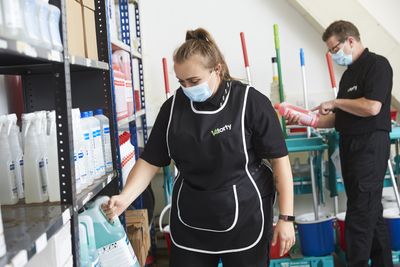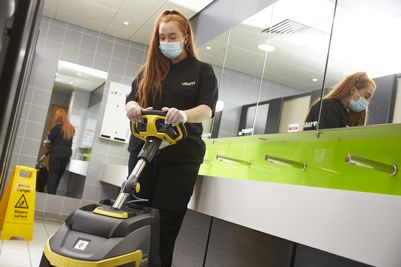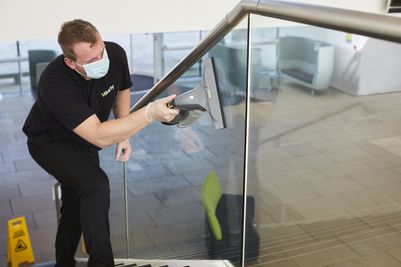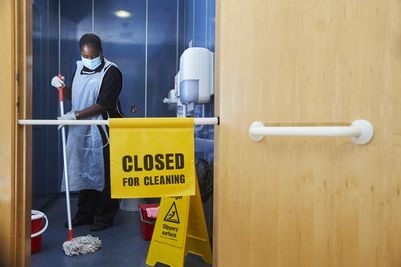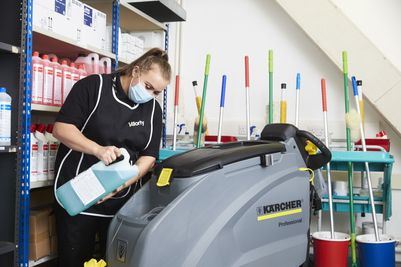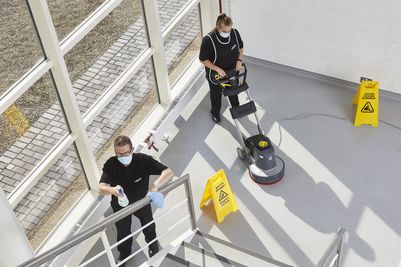Best practice: Ten top cleaning tips as teams return to work
Published:
Read Time: 7 mins
The Covid-19 pandemic has highlighted the critical importance of hygiene and cleanliness in preventing the spread of diseases, particularly in commercial premises that have been operational throughout the lockdown.
Indeed, for companies providing services vital to the day-to-day running of the country, such as those involved in food, manufacturing, utilities and distribution, never has maintaining a clean facility been so essential.
Covid-19 has meant businesses across the UK representing a wide range of industry sectors have had to completely reassess their cleaning processes and procedures. Measures taken are vital to complying with guidance from the Department of Health and Social Care and Public Health England.
Many organisations are turning to professional third-party cleaning contractors, which have the capacity, specialist skills, tools and knowledge to ensure work areas are implementing protocols to the highest standards.
Consequently, these cleaning providers, some of which offer facilities management as an integrated part of their client proposition, are seeing a surge in demand for services.
1. Review use of space:
Businesses need to make sure work areas are as safe as possible by doing everything in their power to reduce the likelihood of Covid-19 transmission and contamination.
Part of this involves companies reviewing how they use their space, planning carefully, and implementing measures to make it easier to navigate, safe, efficient and collaborative.
Introducing one-way systems to encourage a smooth flow of people ‘traffic’ and spacing desks and facilities to maintain social distancing is a good start. Social distancing is not a one-size fits all approach. If the windows do not open and / or the building is poorly ventilated this could facilitate virus transmission, so even seating workers two metres apart may be too close. Ensuring a well-maintained air extraction system is kept operational will be beneficial in these areas.
Another good strategy is to examine the building and define which areas are used the most. Then develop systems that foster a safer and more effective approach – e.g. distributing business activities to make the best use of the space available and avoid clustering dense numbers of employees in one location.
2. Update protocols and cleaning procedures:
Covid-19 has caused changes to cleaning protocols and procedures, especially when it comes to routine environmental cleaning. Surfaces should be categorised into frequently touched (e.g. door handles, rails, tabletops, light switches, equipment etc.) and minimally touched (e.g. floors, ceilings, walls and blinds).
Frequently touched surfaces must be cleaned regularly using suitable sanitising solutions or wipes, the choice of which determined by the nature of the surface and likely degree of contamination. All instances of cleaning should be noted and logged. There are also improved, stronger chemicals available and updated recommendations as to methods of application, which help ensure surfaces are as clean as possible.
In both industrial and office-based applications, clients are also increasingly demanding deep cleaning services, necessitating longer hours, more intricate cleaning and the use of enhanced chemicals and products.
3. Ensure cleaners are visible in the workplace:
Before Covid-19, cleaners were often almost invisible to other workers, visiting industrial facilities and offices out of hours to undertake their services. However, their visibility and prominence are now of critical importance to businesses, which need to clearly communicate the measures they are taking to keep premises clean with staff and customers.
Giving members of the cleaning team different uniforms to demonstrate their individual roles and responsibilities is a good plan, as is scheduling them to clean during busy periods when there is greater footfall.
This will mean buildings are kept clean at all times of the day, reassuring employees returning to work and visitors. Visible, clearly engaged cleaning teams make for happy, satisfied clients and facilitate the building of tangible, mutually beneficial working relationships.
4. Adapt tap water systems to infuse ozone:
Ozone, a pale blue gas which protects us from the sun in the earth’s ozone layer, can react with and break down contaminants. It is possible to fuse ozone with tap water to create an all-natural solution called ‘Stabilised Aqueous Ozone’ (SAO). This is a powerful cleaning product that kills 99.99% of harmful bacteria and many viruses,
SAO can be utilised in spray bottles, mop buckets and cleaning machines to clean and sanitise entire buildings or premises, from floors to windows, ceramics, upholstery, mirrors, kitchens, worktops, carpets and more, using just one batch. It is better for the environment and more effective than traditional detergents.
In the wake of Covid-19, many cleaning contractors are offering SAO cleaning to clients as a value-added service or simply an extension to an existing service, so it may be something to consider.
5. Utilise new technology:
Those providing cleaning services should consider and fully research the technology available to establish whether they could make cost or time efficiencies, whilst maintaining high quality cleaning.
For example, distribution sites must now sanitise delivery vehicles in between different drivers using them. Innovative and portable new equipment that runs off a vehicle’s air conditioning system is available, which makes this a fast and effective process. Some specialist cleaning contractors offer this service.
Of course, there are also a variety of apps available on multiple platforms for tracking which areas of a building have been cleaned and when. Clients can be given direct access to these and create their own reports, not only reassuring them but allowing cleaners to work efficiently.
6. Signage and personal protective equipment (PPE):
Displaying adequate signage and instructions to ensure people understand the new cleaning systems and processes around the premises are essential.
Signage may indicate a particular route round a building, or the location of hand sanitisers, which (it goes without saying) need to be positioned at regular intervals and in accessible areas. However, using signage to demonstrate when a particular room or zone has been cleaned, sanitised and is ready for use is very reassuring to employees, especially those in an office who may find the idea of returning quite daunting.
Naturally, the health and safety of front-line cleaners is extremely important, so they need to be equipped with the correct PPE and use it.
7. Identify and collaborate with partners:
Partnering and collaborating with other specialist companies is a great way of extending cleaning services provision. It means cleaning contractors can tailor solutions to match clients’ needs, whatever industry they operate in. Collaboration also inspires innovation and the sharing of best practice, which is vital in these uncertain times.
8. Adapt labour:
Consider how to change the labour structure to provide a focus on Covid-19 imperative tasks, while reducing or ceasing other, less important tasks during the pandemic by focussing on touch points. This means less cleaning staff are needed and reduces costs on clients’ behalf.
Ensuring best value for clients is vital during these challenging times. Consider multiskilling staff to enable them to take on additional tasks and encourages greater staff engagement and learning.
9. Understand what is important to stakeholders and end users:
All facilities management companies, including cleaning contractors, need to understand what is important to both client stakeholders (i.e. people they engage with on a day-to-day basis, such as operational teams) and end users (i.e. staff who work in the building and visitors who frequent it).
What is important to stakeholders and end users will almost certainly differ. For example, stakeholders may require adherence to budgets and compliance with regulatory considerations, whilst end users need to be made to feel comfortable, reassured and secure in their working environments.
One ‘vanilla’ solution does not suit all. Each client requires a bespoke solution to best meet the needs of their business, so cleaning contractors should engage and consult with all parties to tailor a solution that fits everyone’s needs.
10. Future proof:
It’s widely believed that the coronavirus will impact business and everyday life for the foreseeable future. Therefore, it is imperative to make sure the solutions crafted for a client are robust and adaptable at little or no cost with minimal impact to the client and their customers.
Covid-19 cleaning procedures and solutions should not just be temporary solutions. They must offer longevity, be adaptable to changing regulations and ways of working and minimise disruption for clients.
Mauro Ortelli is the Managing Director of 14forty, the integrated facilities management division of Compass Group UK & Ireland. It provides services such as cleaning, front of house, security and catering across a wide range of industry sectors.
Throughout the pandemic, 14forty has continued to work in various capacities, helping its clients to implement measures and precautions that ensure they comply with guidance from the Department of Health & Social Care and Public Health England.
For more information please visit www.14forty.co.uk
Ends
Editors notes
14forty is a trusted and intuitive integrated facilities management (IFM) business from Compass Group UK & Ireland delivering tailored food and hospitality, cleaning, security, guest and other professional services in one offer.
Through provision of a truly integrated service, 14forty reduces organisational expenditure on facilities management, drives bespoke service agreements and provides better value for money whilst ensuring clients comply with health and safety legislation.
Built on the fact that there are 1440 precious minutes in every day, 14forty is designed to maximise the productivity of each of these for its clients.
Based in Birmingham, the company has a turnover of £110m, employs over 3,000 people and works extensively in the oil and gas, professional services, manufacturing and financial services sectors.

